Mastering Knowledge Process Outsourcing: A Complete Guide
01 Feb 2024 By: Michael Kansky
Updated
I still remember the first time I came across Knowledge Process Outsourcing. I thought it was just another fancy word for BPO. But once I dug deeper, I realized KPO is a whole different level.

What is KPO?
In simple terms, it’s when a company outsources tasks that require brains, not just hands. These are not simple, repeatable jobs. They’re analytical, research-heavy, and skill-based. Think financial forecasting, legal analysis, or data modeling. That’s the KPO meaning. Handing complex, knowledge-driven work to experts who know it inside out.
And that’s exactly why the demand for knowledge process outsourcing services keeps growing. Businesses don’t just want help; they want insight. They want smart people who can think, analyze, and help them make better decisions.
A solid knowledge base management system is key to keeping that knowledge flowing efficiently, especially when teams span across the globe.
KPO vs BPO
If you’ve ever outsourced, you probably know Business Process Outsourcing (BPO). That’s when companies hire others to handle repetitive, everyday tasks, answering customer calls, processing payroll, or managing data.
It’s great for efficiency and cost savings. But Knowledge Process Outsourcing (KPO) takes things a notch higher.
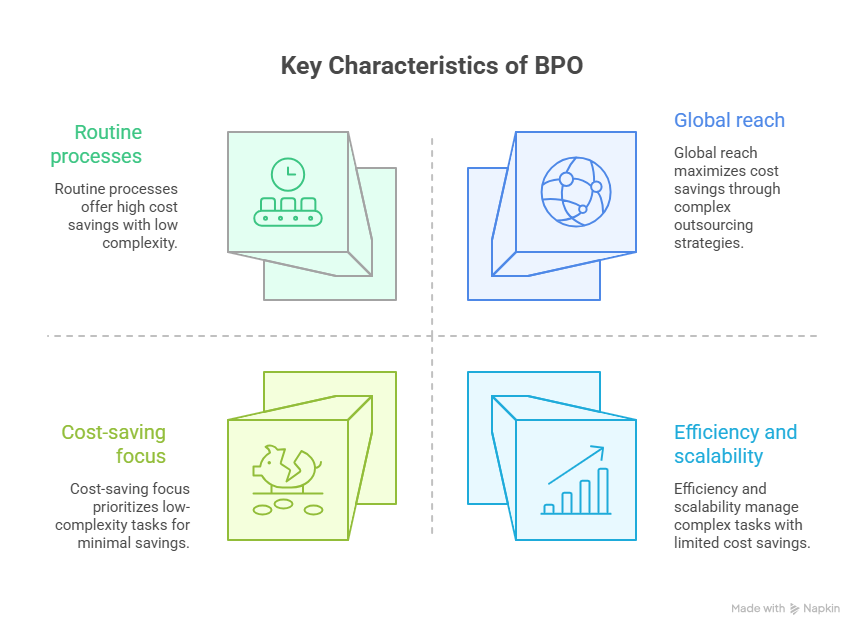
Key Characteristics of BPO:
- Cost-saving focus: Lowering operational costs by outsourcing high-volume, low-complexity tasks.
- Efficiency and scalability: Helps companies handle large workloads efficiently by tapping into the resources of external vendors. Can scale up or down as needed.
- Routine processes: Typically standardized, repetitive, and easy to train for. Includes call center support or transaction processing.
- Global reach: Many BPO providers are located in countries where labor costs are lower. This makes it a good option for companies looking to cut expenses.
Knowledge Process Outsourcing (KPO)
KPO, on the other hand, focuses on outsourcing high-level, knowledge-based tasks. They usually require specialized expertise and advanced analytical skills. KPO is not just about saving costs but also tapping into expert talent that can drive business strategy, innovation, and growth. KPO services include tasks such as market research, legal services, financial analysis, data analytics, and R&D.
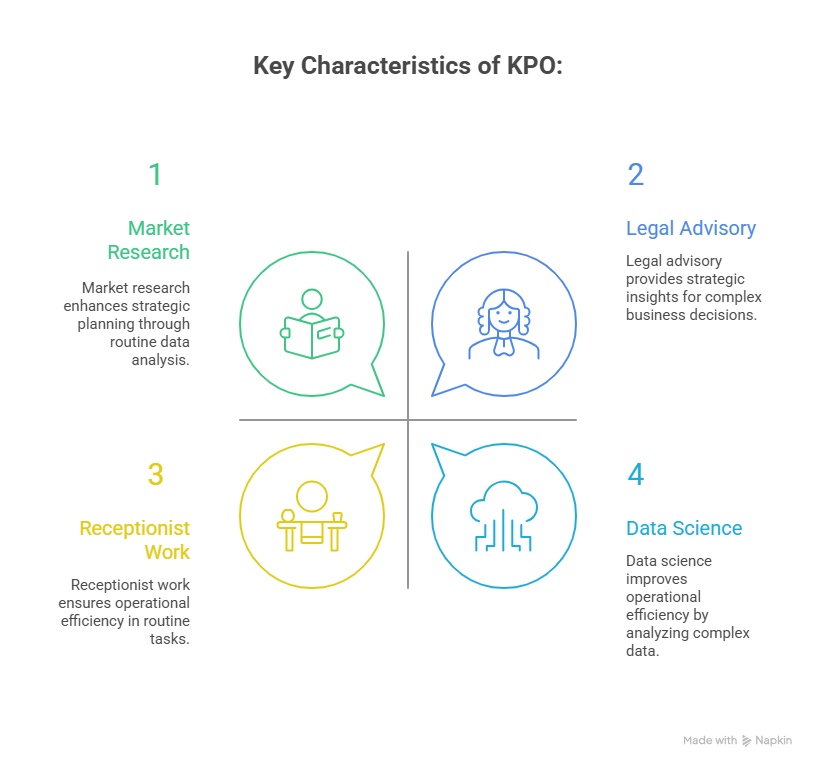
Key Characteristics of KPO
- Specialized expertise: Outsourcing complex, knowledge-driven tasks to experts who possess industry-specific skills and advanced knowledge.
- Innovation and strategy: Designed to enhance business capabilities by providing insights and expertise. This supports decision-making, innovation, and competitive advantage.
- Value-added services: KPO delivers high-value services that directly impact a company’s strategic goals. This includes legal advisory, market research, or data science.
- Knowledge retention: KPO helps businesses develop intellectual capital by leveraging the knowledge and expertise of external specialists.
Types of KPO Services
The range of KPO services is huge. From data analytics and research to legal process outsourcing and R&D. There’s a KPO solution for almost every industry.
- Market Research & Analytics: Understanding trends, consumer behavior, and market opportunities.
- Financial Services: Investment analysis, accounting, and forecasting.
- Healthcare Knowledge Services: Data management, claims, and clinical documentation.
- Legal Process Outsourcing: Research, drafting, and contract review.
- R&D Outsourcing: Innovation without the massive in-house cost.
Every one of these knowledge process outsourcing services requires specialized skill — the kind you’d usually only find in top-tier analysts or consultants. That’s what sets KPO service providers apart. By working with KPO companies, they get to work with experts who are adept at handling tasks that require deep knowledge in various fields. Similarly, a business that wants to launch or upgrade a mobile product can hire dedicated android developer through specialized vendors, gaining platform-specific expertise without the overhead of permanent recruitment. Businesses adopting RPO solutions can enhance their recruitment efficiency and gain access to specialized hiring expertise.
Transform BPO efficiency with data analytics insights – read now!
Key Players in the KPO Industry
The Knowledge Process Outsourcing (KPO) industry is dominated by a handful of trusted companies that provide specialized knowledge services. Here are some of the top players:
Genpact
Offers expertise in:
- Finance & accounting
- Procurement
- Supply chain management
- Risk management
Evalueserve
Known for strength in analytics
- Services include:
- Market research
- Data management
- Business intelligence
Wipro
- Financial research and legal outsourcing
- Focuses on innovation in knowledge services
Infosys
- Financial research and legal outsourcing (similar to Wipro)
- Known for process automation expertise
Why They Matter
These KPO service providers are shaping the industry. They’ve proven that deep expertise can be outsourced successfully and profitably.
Advantages and Disadvantages of KPO
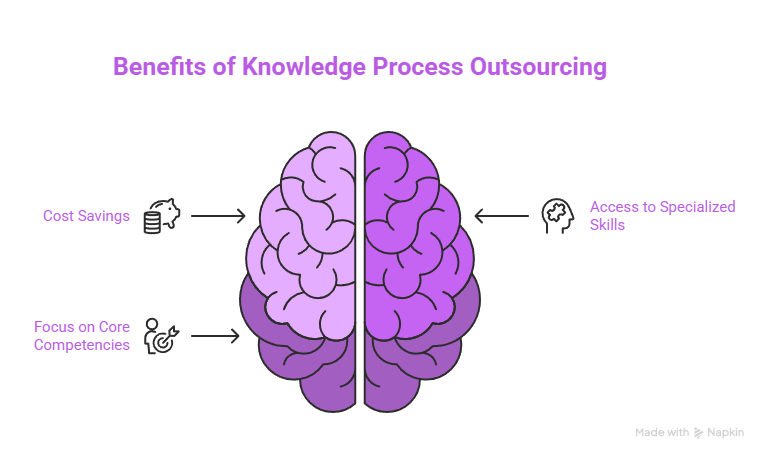
Like anything, Knowledge Process Outsourcing has pros and cons.
Access to Specialized Skills and Expertise
The biggest advantage? Access to specialized skills. You get the kind of experts who’d normally cost a fortune to hire in-house. Whether you need data scientists or financial analysts, KPO companies give you that high-level talent on demand. Students also often seek expert help. A reliable college paper writing service can enhance their academic performance.
Cost Savings
Then there’s cost savings. Hiring full-time experts can be expensive. Outsourcing those roles lets you save money while still getting world-class results.
Level up your customer service game now with our ultimate outsourcing guide!
Challenges of Knowledge Process Outsourcing
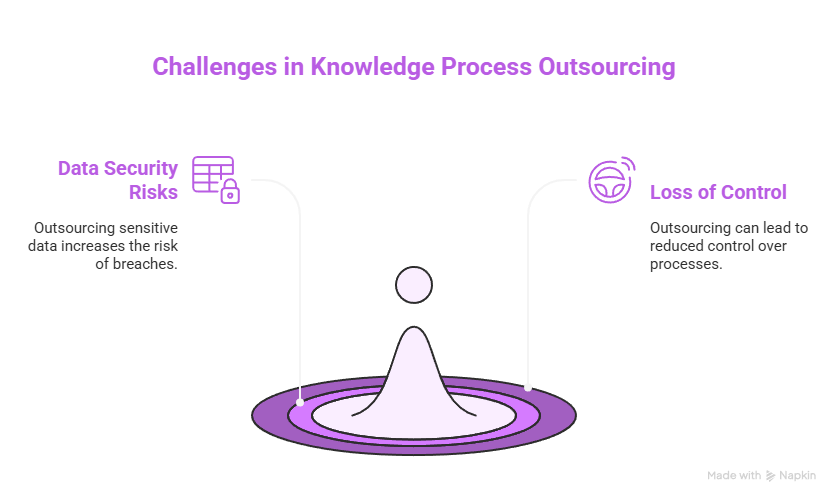
Of course, KPO has challenges too. Mostly around data security and control. You’re trusting another company with sensitive information. That’s why choosing the right KPO service provider is critical. Make sure they have airtight security and clear service-level agreements.
Data Security Risks
A big challenge in KPO is data security. Outsourcing complex tasks means sharing sensitive info with providers. Without strong security, data breaches can happen.
So, it’s vital for businesses to carefully check a KPO provider’s security before partnering. They need to make sure the provider follows strict data protection rules and has solid security measures.
Loss of Control Over Business Processes
Losing control over business processes is another KPO challenge. Outsourcing means giving up some control. If the provider falls short on quality or efficiency, it can cause problems.
That’s why setting clear service level agreements (SLAs) with the provider is key. These SLAs must spell out both sides’ expectations and duties. Doing so can help lessen the risk of losing control over processes.
Future of Knowledge Process Outsourcing
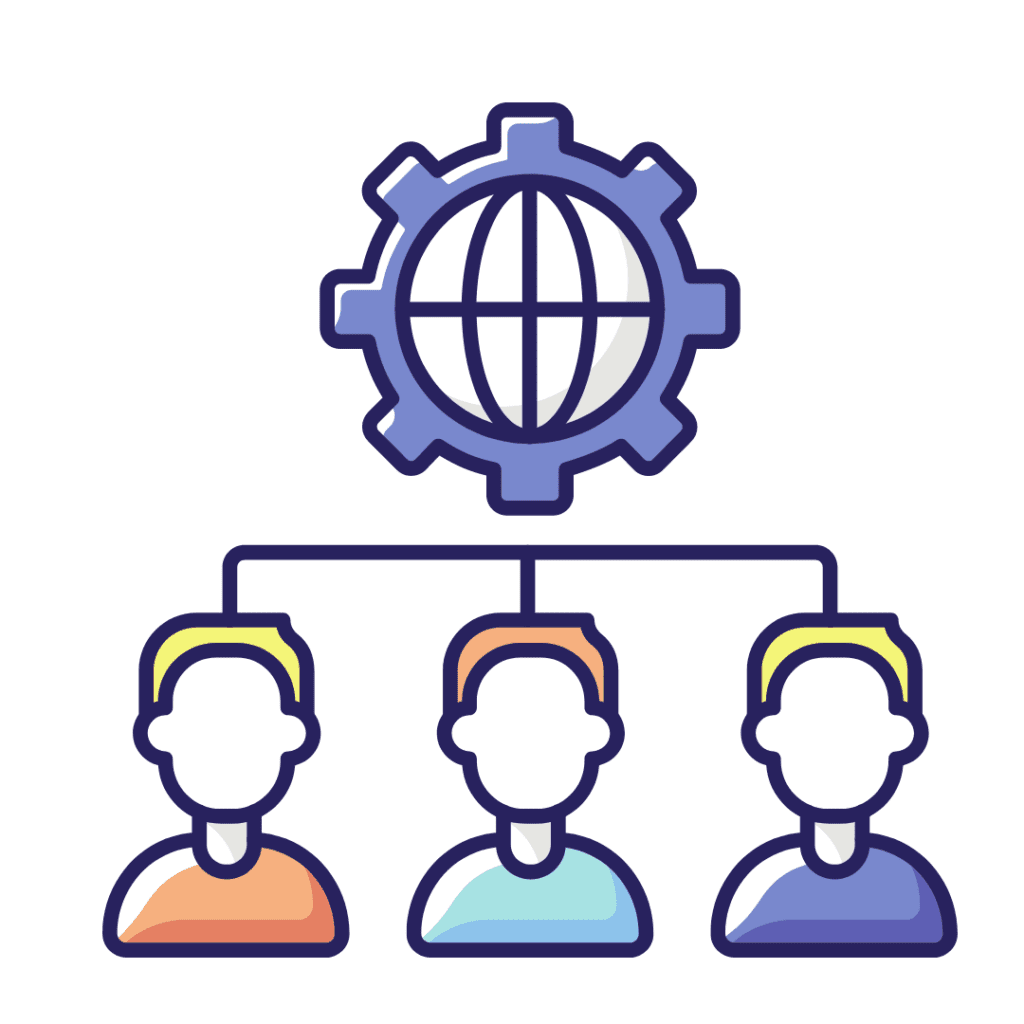
The future of knowledge process outsourcing looks promising. As technology like AI and machine learning evolve, KPO companies are using them to deliver even smarter insights.
Imagine getting predictive analytics, faster research, or automated data analysis. All through your KPO service provider. That’s where we’re headed.
Businesses are realizing that staying competitive isn’t just about cutting costs anymore. It’s about accessing deep knowledge, faster. That’s the real KPO meaning in today’s world.
Role of Technology in KPO
Technology is at the core of KPO sector. Breakthroughs in areas like AI and machine learning are changing how KPO services work. Making it possible for providers to offer services more efficiently and effectively.
Unlock unparalleled efficiency in BPO operations with AI and automation!
Increasing Demand for KPO Services
As companies focus more on what they do best, they’re turning to KPO for help with specialized tasks that can give them a competitive edge. Unlike BPO, which handles routine tasks, KPO offers expert services like market research, data analysis, and financial consulting.
With companies going global, the need for KPO services is growing even more. KPO providers bring that deep knowledge to the table, helping businesses make smarter decisions and succeed.
Trending Now
An article from Yahoo! shines a light on the emerging trend of KPO. Explaining how KPO stands out from traditional BPO. It focuses on more intricate and value-driven tasks. Including in-depth research, analytical reasoning, and creative problem-solving. The narrative tells us benefits of KPO, including significant cost reductions. Plus the acquisition of niche expertise and a boost in operational efficiency.
FAQs on Knowledge Process Outsourcing (KPO)
What is Knowledge Process Outsourcing (KPO)?
Knowledge Process Outsourcing (KPO) is when a company outsources specialized, knowledge-based tasks (market research, data analytics, or legal research) to external experts. KPO focuses on analytical and strategic work that requires advanced skills and expertise.
How does KPO differ from BPO?
While Business Process Outsourcing (BPO) focuses on repetitive tasks, KPO handles complex processes that demand critical thinking and domain expertise. In short, BPO is about efficiency and KPO is about insight and innovation.
What are the main benefits of KPO for businesses?
KPO gives companies access to
-specialized talent
-deeper insights
-cost-effective expertise
Without hiring full-time professionals. It helps organizations innovate faster, make smarter data-driven decisions, and stay competitive in their industries.
What are the main challenges of KPO?
Biggest challenges include data security risks and loss of control over outsourced processes. Since KPO involves handling sensitive information, companies must partner with providers who follow strict security measures and have clear service-level agreements (SLAs).
What does the future of KPO look like?
The future of KPO is being shaped by AI, automation, and machine learning. Technologies that are helping providers deliver smarter insights, faster analysis, and more value-driven services. As businesses focus on knowledge and innovation, KPO will continue to grow in demand.
Conclusion
At the end of the day, KPO is about tapping into global intelligence. It’s about partnering with experts who bring value beyond routine work.
If you’re serious about scaling, not just growing. It might be time to explore knowledge process outsourcing services for your business.
And if you’re already thinking about where to start, HelpSquad can help. Our team of trained professionals provides the kind of high-level support that helps you focus on what you do best while we handle the rest.
Talk to us today and see how outsourcing smarter can transform your business.


